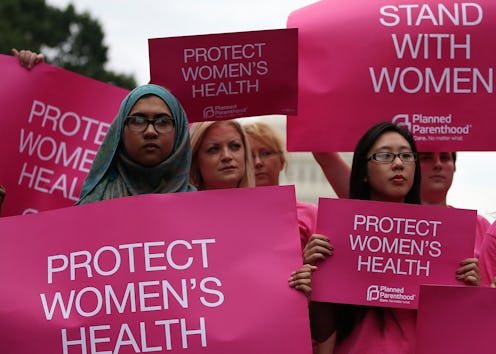News
U.S. Judge Keeps Louisiana Abortion Clinics Open
Although they were passed smoothly in the state legislatures, laws targeting abortion providers are having a rough ride as they make their way through the federal courts. Just two days after a U.S. district judge struck down part of a Texas law that would have closed most of the state's abortion clinics, a federal judge temporarily blocked a Louisiana abortion law from being enforced. The law, which requires all abortion providers in the state to have admitting privileges at a local hospital, was signed by Louisiana Gov. Bobby Jindal in June and would have been enacted starting Sept. 1.
Judge John deGravelles issued the temporary restraining order to give clinic administrators more time to secure admitting privileges for their physicians. However, the judge's ruling, at this time, only applies to the plaintiffs in the case, which represent three of the state's five abortion clinics. deGravelles said in his decision:
The Act will be allowed to take effect but Plaintiffs will not be subject to the penalties and sanctions allowed in the statute at this time or in the future for practicing without the relevant admitting privileges during the applications process. Plaintiffs will be allowed to operate lawfully while continuing their efforts to obtain privileges.
If the three clinics in the case were to stay open on Sept. 1 without having admitting privileges in place, they would face up to $4,000 in penalties per violation, as well as possible suspension of their medical licenses. As a result, the clinics will altogether close. With the temporary restraining order, the three clinics will be able to "operate lawfully" as they seek admitting privileges.
deGravelles concluded:
The Court finds that Plaintiffs have shown that irreparable injury would occur if the Act were enforced against them. It is well settled that, in cases challenging laws based on a violation of constitutional rights, once a constitutional violation is demonstrated, no further showing of irreparable injury need be shown.
Nancy Northup, president and CEO of the Center for Reproductive Rights, praised the federal judge for acknowledging the "flimsy façade" of the Louisiana law:
Today’s ruling ensures Louisiana women are safe from an underhanded law that seeks to strip them of their health and rights. Politicians cannot be given free rein to lie about their motives without recourse, and expect women and their families to pay the consequences. ... We continue to look to the courts to uphold the Constitution and protect access to safe and legal abortion for all women regardless of where they happen to live.
Louisiana already has some of the harshest abortion laws in the U.S., including a 24-hour waiting period, a mandated ultrasound where women are forced to look at the image, and state-directed counseling that discourages women from having an abortion. The counseling session must be done in person, necessitating two trips to the clinic. The state also has a parental consent law, and no Medicaid funds or insurance coverage can be used for abortion procedures except in cases of rape, incest or life endangerment.
According to the Guttmacher Institute, 92 percent of Louisiana counties — representing more than 60 percent of Louisiana's women — don't have an abortion provider. Under the new admitting privileges law, reproductive rights advocates said all five of the state's abortion clinics may be forced to close.
However, deGravelles said he still needed more information on this claim before proceeding in the case:
How many patients do these other two facilities treat? How many doctors practice there? How many of these doctors have applied for admitting privileges and what is the status of their applications?
Although anti-abortion politicians claim admitting privileges laws act as safeguards for women's health care, they have been considered a back-door abortion ban by reproductive rights activists. Similar admitting privileges laws were passed in Mississippi and Alabama with the intent to close the states' last remaining clinics, but both laws were struck down by federal courts this summer.
Images: Getty Images (3)
